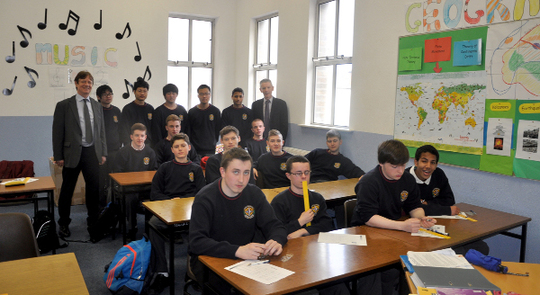STUDENTS at three Dublin schools got a taste of what career opportunities are on offer in Brussels when EU officials visited their old alma mater across the city last week.
Coláiste Mhuire in Cabra, St Paul’s CBS in North Brunswick Street and Chanel College in Coolock were graced by three former pupils who gave pocket histories of the evolution of the EU and its impact on the daily lives of young people, as well as their individual journeys from secondary school to their current work in Brussels.
The visits were some of dozens being organised around the country as part of the European Parliament Office in Ireland’s annual
‘Back to School’ week, which allows Irish people working in Europe to share their experiences with young people in their home towns.
Brendan Dignam returned to Coláiste Mhuire, now re-located to Cabra from its original city centre location that he remembers. He spoke to transition year and fifth year pupils about his current work in the secretariat of the European Parliament’s Economic and Monetary Affairs Committee, and encouraged students to visit EU House in Dublin.
He also emphasised the importance of Gaeilge as an official EU language in the context of working in the EU institutions.
Brendan was asked pertinent questions by the students when he touched on the problems facing the euro, such as
‘Where has all the money gone? When will the recession end? Why does the ECB not just print money? And Do EU civil servants get free cars?’
However, he found the students’ general knowledge on the EU was less positive, and questions such as
“What year did Ireland join? Which country currently holds the presidency? And what is the name of Ireland’s Commissioner?
? were met with
“mostly blank stares or guesses
?.
Meanwhile, Fearghas O’Beara, advisor to the Deputy Secretary General of the EP, enjoyed his visit to Chanel College in Coolock, where he said students knew a lot of basic information about the EU.
However, he observed that many of the historical bases for European integration were unfamiliar to the younger generation, such as Franco-German reconciliation and the end of communism.
“For example, I was asked ‘What is a communist?’ and it came home to me that this is a generation which not only has no memory of WW2, but neither of the Cold War; and that concepts like the Soviet Union, Iron Curtain and Berlin Wall are all unfamiliar to them, as they have grown up in a unified Europe,
? said Fearghas.
Elsewhere, Joseph Dunne had a
“rewarding experience
? when he spoke to transition year pupils at St Paul’s CBS on North Brunswick Street, or ‘Brunner’ as he remembers it called.
He said he found it useful to give the pupils of the inner-city school a vision of the opportunities and possible career paths in Europe and to help develop awareness of the relevance of the European Union over Ireland’s 40-year membership.
“The students were most interested in current affairs topics such as the consequences of a possible UK exit from the EU or the nature of the banking crisis,
? he said.
